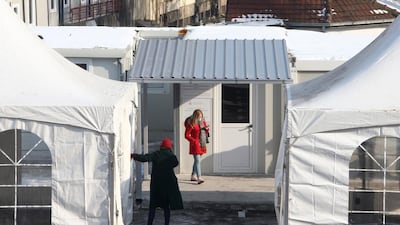UN Secretary General Antonio Guterres on Wednesday urged wealthy countries to launch an emergency task force to make vaccines available worldwide, to stop the coronavirus from mutating and staging comebacks.
Without such a global vaccination plan, the virus will "spread like wildfire in the global South" and "mutate again and again" into deadlier, more transmissible variants of the bug that "come back to plague the global North", he said.
A task force from the G20 group of major economies would bring together countries that develop and manufacture vaccines with the World Health Organisation, technical agencies and banks and have the power to mobilise drug manufacturers and logistics companies, he said.
Mr Guterres said vaccine distribution had been "wildly uneven and unfair", with 10 rich-world countries administering 75 per cent of global vaccine jabs, while "more than 130 countries have not received a single dose".
"Vaccine equity is the biggest moral test before the global community," Mr Guterres told an online UN Security Council meeting.
“When pandemic strikes, we are only safe if everyone is safe.”
A meeting of the group of seven (G7) big democracies on Friday, at which US President Joe Biden will speak, offers a chance to "create the momentum to mobilise the necessary financial resources" for the task force, Mr Guterres said.
“Together, we can ensure sufficient supply, fair distribution and vaccine confidence,” said the former prime minister of Portugal.
“We can defeat this disease. And we can get our economies running again.”
Henrietta Fore, director of the UN agency for children, Unicef, said that those living in Yemen, Libya and other war zones found it harder than others to access vaccines, and called for a “global ceasefire” to take the pressure off medical teams in global hot spots.
The council met after the WHO said late on Tuesday that the global number of new coronavirus cases had declined by 16 per cent over the previous week. However, more virulent strains of the bug broke out in several regions.
The world has recorded more than 109 million cases and more than 2.4 million coronavirus-related deaths since the pathogen was first reported in the central Chinese city of Wuhan in December 2019.
In his first international appearance since becoming US Secretary of State, Anthony Blinken said the US would come good on more than $200 million it owed to the WHO by the end of the month.
Shortly after taking office in January, US President Joe Biden's administration announced plans to remain a dues-paying member of the UN's health agency, reversing Trump-era decisions to exit an agency it said was biased towards China.
"Today, I'm pleased to confirm that by the end of the month, the United States intends to pay over $200 million in assessed and current obligations to the WHO," Mr Blinken said in his UN Security Council debut.
"This is a key step forward in fulfilling our financial obligations as a WHO member and it reflects our renewed commitment to ensuring the WHO has the support it needs to lead the global response to the pandemic, even as we work to reform it."
Also at the meeting, S Jaishankar, Minister of External Affairs for India, a major vaccine producer, said his government would donate 200,000 vaccine shots to inoculate the UN's peacekeepers, who are stationed in hot spots around the world.


